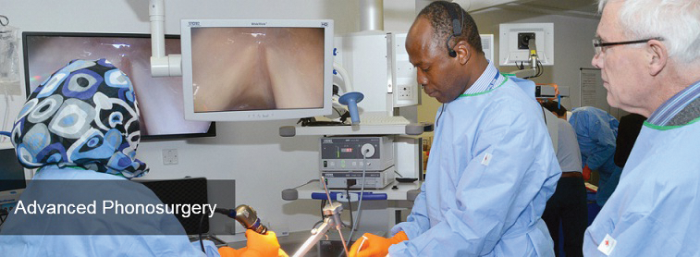Historically the relationship between industry and the NHS has been a cautious one. Both sides have typically worked with only partially disclosed agendas, under a pervading fear of finding themselves on the wrong end of a win-lose negotiation. Things have been changing though with the pharmaceutical industry in particular undergoing a period of intense transformation shifting away from traditional ‘selling’ models to ones more centred on collaboration.
Merz Pharma UK Ltd is a pharmaceutical and devices company with a product range used in ENT and other specialty areas. In recent years the company’s global leaders have stressed the importance of effective partnerships, setting a goal to be one of the most trusted, admired and innovative partners within the industry. Merz has a strong history of practical education for clinicians, pioneering innovative training programs such as the laryngoplasty and laryngeal framework surgery workshops which run annually in Manchester, and they are not alone in wanting to take these ventures much further.
Indeed, now more than ever before, the pharmaceutical and medical devices sectors are seeking partnership opportunities with the NHS and other healthcare providers, for the ultimate benefit of patients. Despite this, examples of open and truly collaborative partnerships remain relatively uncommon. This article aims to provide an insight into the rules and regulations by which the industries operate, to enable healthcare professionals to more confidently engage and collaborate with the pharmaceutical and medical devices industries.
Industry codes
Similar to the codes of conduct that govern the ethical behaviour of healthcare professionals, codes for both industries, which reflect EU codes and incorporate UK laws, set the standards for ethical and professional business practices within their respective industries.
In the pharmaceutical industry, the Association of the British Pharmaceutical Industry (ABPI) Code of Practice [1] covers a wide range of interactions with healthcare professionals, including promotion, service provision, sponsorship, hospitality and joint working. The scope of the APBI code of conduct is limited to prescription only medicines.
The medical devices industry is covered by the Association of British Healthcare Industries (ABHI) Code of Business Practice. [2]
To champion the benefits and use of safe and effective medical technologies to deliver high quality patient outcomes
ABHI mission statement [3]
General principles
With patient safety at the heart of both Codes of Practice, any activities to be undertaken by companies wishing to work with the healthcare professionals or institutions, must:
- Benefit patient care or improve patient outcomes
- Benefit the NHS whilst maintaining patient care, or
- Support research
Generally, companies are required to act in an ethical and transparent manner, and with the introduction of the Bribery Act 2010, there are increasing restrictions on the activities that pharmaceutical companies, in particular, are able to undertake.
Sponsorship and support – What can the industry do?
Healthcare professionals are often confused with regards to what activities and items are eligible for sponsorship and support by pharmaceutical and medical devices companies, and understandably so. The Codes that govern these industries provide only a framework, or guidelines, regarding the principles to uphold when conducting business with healthcare professionals, with limited examples for specific situations. It is up to the individual companies themselves to interpret and act within the relevant codes of practice. Therefore there may be much variability in what a company may or may not sponsor or support.
Generally, any sponsorship or support provided by the industry must be transparent, and directly or indirectly benefit patients They must NOT be given as an inducement to prescribe, or be for exclusive benefit of any specific healthcare professional.
Some of the items commonly sponsored or supported by the industries are:
Meetings
- This may include: training sessions, international conferences, departmental educational meetings, third party meetings, etc.
Research and clinical support
- This may include: funding for investigator initiated trials, publication and medical writing support, provision of services (e.g. funding a nurse-led clinic), etc.
Training and education
- This may include: sponsorship to attend conferences, funding for departmental training programmes and resources
Joint Working – The collaborative approach
Since the introduction of the Bribery Act, companies are now moving towards a more collaborative approach when dealing with healthcare professionals and institutions with a particular drive for transparency for who is getting what in a joint venture. Both the ABPI and ABHI are continually encouraging industry partnership with the NHS for the benefit of patients. One of the key elements of Joint Working is that all parties must contribute in a truly collaborative way, working together towards a common goal.[4]
This transformation in approach is further reflected in the pharmaceutical industry’s ABPI Code of Practice, as Joint Working [5]. The Department of Health defines Joint Working as situations where, for the benefit of patients, the NHS and the industry pool skills, experience and/or resources for the joint development and implementation of patient centred projects and share a commitment to successful delivery.
“The future of relationships between both the pharmaceutical and medical devices sector and healthcare professionals is set to be strong.”
Transparency is a key factor with regards to Joint Working projects, making clear what benefits are expected to be gained by the Industry, the NHS and patients. Furthermore, both the NHS and the Industry must agree to take a shared accountability and responsibility with regards to the delivery and conduct of the project.
The future of relationships between both the pharmaceutical and medical devices sector and healthcare professionals is set to be strong. The requirement of a common goal is necessary to achieve a successful collaborative outcome and an understanding from both parties of the rules and regulations that safeguard the industry.
Industry representatives – Who are they?
ENT clinicians, and other healthcare professionals, may meet a number of industry representatives, over the course of their career. The most widely known industry representative known to the healthcare professional is the sales representative. However, there are a number of other industry personnel that the healthcare professional may meet face to face. Generally, these can be split into two broad categories:
• Commercial personnel These include sales representatives, (key) account managers, marketing managers and health economists. Commercial personnel are often business experts, and their interactions with various healthcare professionals generally concern business projects, sales, commissioning and funding/sponsorship requests.
• Medical and research personnel These include the medical scientific liaisons, scientific advisors, medical advisors and clinical research personnel. Medical and research personnel are scientific and/or product experts within their designated therapeutic area(s). They may be involved with clinical research projects, publications, information requests, and educational or training support.
References
1. Association of the British Pharmaceutical Industry ABPI) Code of Practice, 2014
2. Association of British Healthcare Industries (ABHI) Code of Business Practice, September 2013
3. www.mhra.gov.uk/home/groups/pl-a/
documents/websiteresources/con2022582.pdf
4. www.abhi.org.uk/about/mission-statement.aspx
5. www.google.co.uk/url?url=http://
www.networks.nhs.uk/nhs-networks/
joint-working-nhs-pharmaceutical/
documents/joint%2520working%2520
toolkit%2520dh.abpi.pdf&rct=j&frm=1&q=&esrc=s&sa=U&ei=QR5m
VJ7GJePiywOsoIKQAw&ved=0CBQQFjAA&usg=z
AFQjCNEZxZW42bOEiUMQ2IL35auP7vipVA
Further Reading
Association of the British Pharmaceutical Industry (ABPI) Code of Practice
www.abpi.org.uk/our-work/library/guidelines
Association of British Healthcare Industries (ABHI) Code of Business Practice.
www.abhicodeofpractice.org.uk/
Declaration of competing interests: ZD and JS are employees of Merz Pharma UK Ltd.






